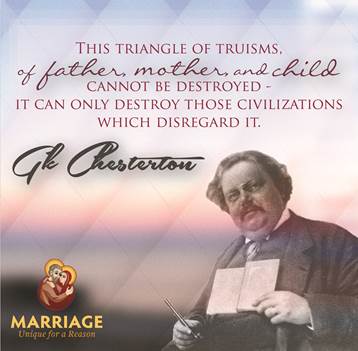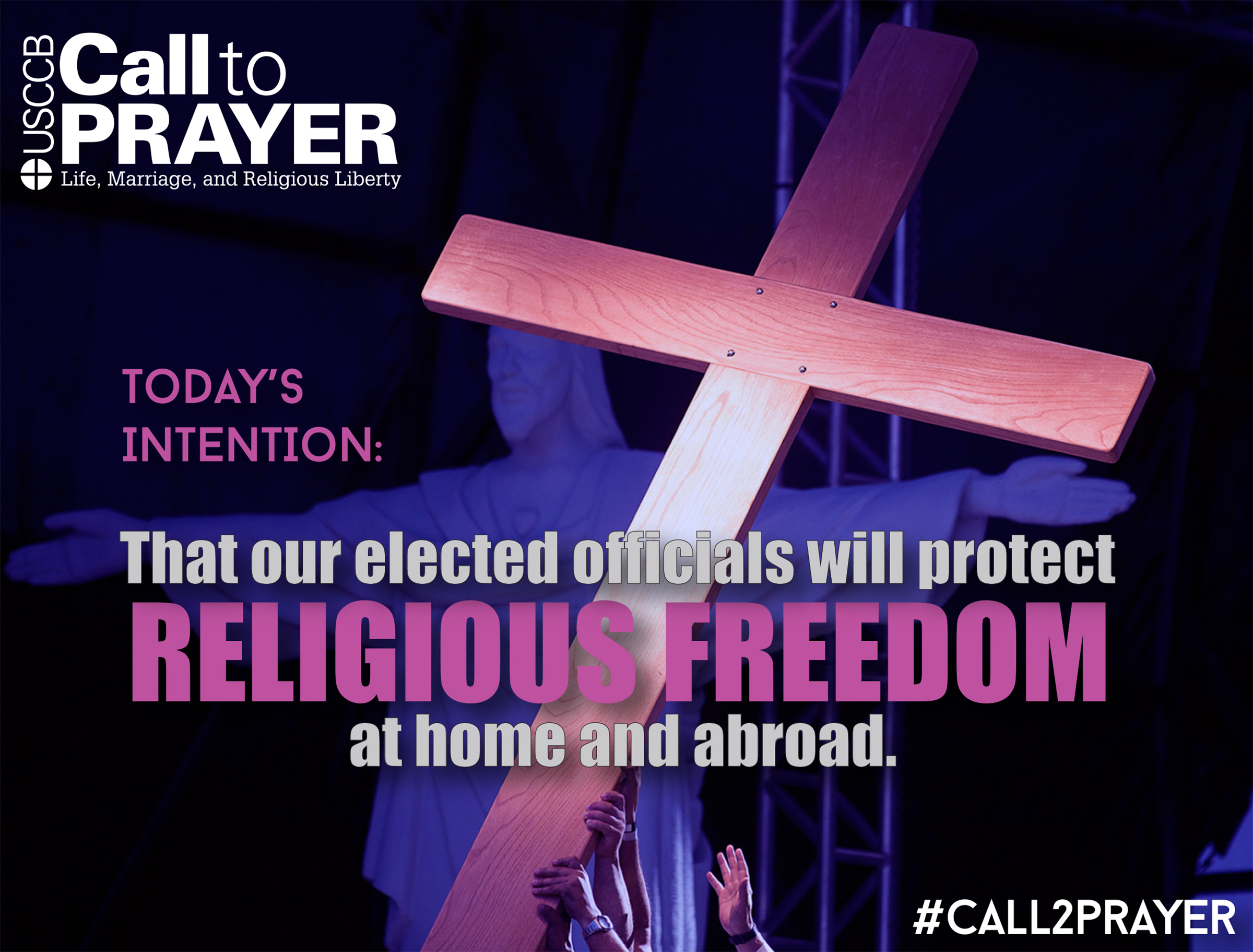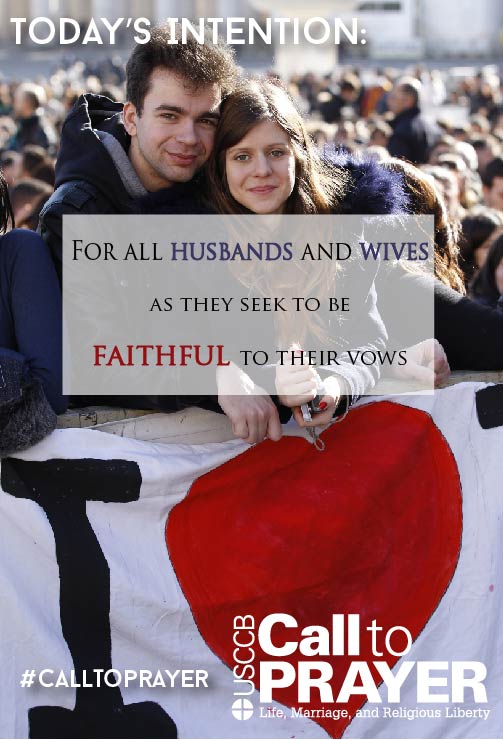Call to Prayer: February 27
Archive
World Meeting of Families Catechesis: Chapter Four
 World Meeting of Families Catechesis Series
World Meeting of Families Catechesis Series
The USCCB is excited about the World Meeting of Families (WMF) being held in Philadelphia in September 2015. We are presenting a series of short articles focused on the WMF Catechesis Love is our Mission: The Family Fully Alive and its implications for our daily lives. We will follow the timing suggested by the Archdiocese of Philadelphia by exploring one theme each month leading up to the World Meeting.
Chapter Four: Daily Choices for Love
Rebecca Baehrend, Secretariat of Laity, Marriage, Family Life and Youth
Reading this chapter, I was struck by the emphasis on the importance of day-to-day interactions. Relationships with other people, whether in marriage, or friendship, always require a choice. Pope St. John Paul II talked about the gift of self, how each person is called to give their life away in a specific way. This beautiful idea is not about a one-time sacrifice, but an ongoing journey. Our relationships continue to grow as we grow; they are always in motion. A commitment for “always” is necessary, especially in marriage, but it is lived out in thousands of different choices every day.
Since I have never been married, reading this chapter (especially Pope Francis’ first quote in paragraph no. 60), reminds me of my relationships with my roommates and my siblings. Putting forth daily effort makes a huge difference. I’ve come to see that the little things (good or bad) add up over time. Do I grumble about little things that bother me or try to stay focused on the positive? When something is really bothering me, do I have the courage to charitably talk about it with the other person or do I just try to ignore it, silently growing more frustrated?
Pope Francis talks about our call to a “culture of encounter” and wants each of us to bring genuine joy to other people. Do I pay attention to what types of things might make that other person feel loved or appreciated?
I have a housemate whom I love dearly and we have very different personalities. I’m more naturally creative than she is, while she is more expressive and enthusiastic. Every so often, I play harmless little pranks on her, not because I do it naturally, but because I know it will make her feel loved. I get a lot of joy out of seeing her eyes light up at the most recent ridiculous thing I’ve done.
Commitment to one another in relationships is not just about sacrifice; it’s also about bringing out joy.
Regarding marriage, I think that Pope Francis’ words are beautiful when he says that “the husband has the task to make his wife more woman and the wife has the task to make her husband more man” (no. 60). It all comes back to daily choices for love. Husbands and wives are called to use their specific gifts and talents to help each other grow every day. Through these daily choices, spouses help each other become the saint that they are called to be.
What is one small thing I can do today to help my spouse, family member or friend become more of the person that they are called to be?
Archive
Evangelii Gaudium, Marriage and Family: Part Seven
 Pope Francis’s Apostolic Exhortation on the proclamation of the Gospel in today’s world, Evangelii Gaudium or “The Joy of the Gospel,” has many points that are relevant to the work of Marriage: Unique for a Reason. This series will explore some of these themes and apply Pope Francis’s words to the culture of marriage and family in the United States.
Pope Francis’s Apostolic Exhortation on the proclamation of the Gospel in today’s world, Evangelii Gaudium or “The Joy of the Gospel,” has many points that are relevant to the work of Marriage: Unique for a Reason. This series will explore some of these themes and apply Pope Francis’s words to the culture of marriage and family in the United States.
We Are All Missionary Disciples
“The new evangelization calls for personal involvement on the part of each of the baptized” (no. 120). Pope Francis includes everyone, young and old, in his call for missionary disciples. He reminds us that throughout the New Testament, those who encountered Jesus were changed and sent forth to others.
After being healed by Jesus in the Gospels, the former Gerasene demoniac wanted to stay with and follow Christ with the other disciples. Jesus “would not permit him but told him instead, ‘Go home to your family and announce to them all that the Lord in his pity has done for you’” (Mk 5:19). We, too, are sent home to proclaim the Gospel.
The family is the place we are first called to evangelize, and sometimes it can be the hardest. Why is this? Why does it sometimes seem more difficult to speak of what God has done in your life with your mom, dad, or sibling than with a relative stranger at a retreat? Why can it be harder to tell your own children what God’s relationship means to you than it is to tell children you teach at catechism class?
Perhaps it is because, in our families, we often assume that we know each other better than we do. We may have watched them grow up, or we have grown up under their watchful gaze, and so we assume that they have nothing new to tell us. Or, on the other hand, we are humbled because the people in our family know our faults and have seen our mistakes more than anyone else. Why would they believe what we say about God when they heard us yelling at our brother yesterday about the mess he left in the bathroom? We realize that we need to conform our lives to Christ in order to be credible witnesses.
This week, may we seek to be missionary disciples first within our own families. Then we will be even more empowered by the Spirit to, “Go out to all the world and tell the Good News” (Mk 16:15).
Archive
Call to Prayer: February 20
Archive
Evangelii Gaudium, Marriage and Family: Part Six-point-five
 Pope Francis’s Apostolic Exhortation on the proclamation of the Gospel in today’s world, Evangelii Gaudium or “The Joy of the Gospel,” has many points that are relevant to the work of Marriage: Unique for a Reason. This series will explore some of these themes and apply Pope Francis’s words to the culture of marriage and family in the United States.
Pope Francis’s Apostolic Exhortation on the proclamation of the Gospel in today’s world, Evangelii Gaudium or “The Joy of the Gospel,” has many points that are relevant to the work of Marriage: Unique for a Reason. This series will explore some of these themes and apply Pope Francis’s words to the culture of marriage and family in the United States.
A People for Everyone
The Church as the Body and Bride of Christ is saved by Him as one. “No one is saved by himself or herself, individually, or by his or her own efforts. God attracts us by taking into account the complex interweaving of personal relationships entailed in the life of a human community” (no. 113). We are connected to one another.
Perhaps nowhere else is this as clear as in the family; in the family, we are bonded together for life to a number of other people, without any choice in the matter. As G.K. Chesterton put it: “The best way that a man could test his readiness to encounter the common variety of mankind would be to climb down a chimney into any house at random, and get on as well as possible with the people inside. And that is essentially what each one of us did on the day that he was born” (“On Certain Modern Writers and the Institution of the Family”). The people in our families were picked out for us by God, not by us. Even when a child is adopted, or someone is taken in to a family for a time, the mystery of that person always exceeds our limited understanding of them.
Chesterton continues: “Aunt Elizabeth is unreasonable, like mankind. Papa is excitable, like mankind. Our youngest brother is mischievous, like mankind. Grandpapa is stupid, like the world; he is old, like the world. Those who wish, rightly or wrongly, to step out of this, do definitely wish to step into a narrower world” (ibid.). It is in the family that we learn how to navigate the differences between people while maintaining love for them and living with them. When we are living it well, we learn in the family how to “bear with” one another with patience. We learn to place things in perspective and how to get along. We learn how to pray, how to approach God and others for forgiveness, and how to extend mercy to others as well.
These are the lessons that are extended to our parishes and the universal “family of families” which is the Church. Families, Pope Francis and G.K. Chesterton both remind you: God has given you each other precisely that you may journey to salvation together. May God bless that journey!
Archive
50 Hues not 50 Shades
 In light of the cultural phenomenon of Fifty Shades of Grey, the bishops and other religious leaders have responded, reminding us all of the truth and beauty of the gift of sexuality in marriage. Here are some of the responses:
In light of the cultural phenomenon of Fifty Shades of Grey, the bishops and other religious leaders have responded, reminding us all of the truth and beauty of the gift of sexuality in marriage. Here are some of the responses:
Bishop Richard Malone, Chairman of the Committee on Laity, Marriage, Family Life and Youth: Letter to Bishops
Archbishop Dennis Schnurr: Note to Pastors
Bishop Paul Loverde: Porn Goes Mainstream
Religious Alliance against Pornography Statement, signed by several Catholic Bishops
Morality in the Media: Statement
Let us pray for all those involved in the film, and for all those planning to see it this weekend.
Archive
Call to Prayer: February 13, 2015
Archive
Archbishop Coridileone supports SMDA
Representative Randy Weber and Senator Ted Cruz reintroduced legislation into the House and Senate that would protect states’ marriage amendments: the State Marriage Defense Act. Archbishop Cordileone sent them each a letter of support (Cruz and Weber) and announced this for the media.
Let us keep praying and fasting!
Archive
Evangelii Gaudium, Marriage and Family: Part Six
Pope Francis’s Apostolic Exhortation on the proclamation of the Gospel in today’s world, Evangelii Gaudium or “The Joy of the Gospel,” has many points that are relevant to the work of Marriage: Unique for a Reason. This series will explore some of these themes and apply Pope Francis’s words to the culture of marriage and family in the United States.
Other Ecclesial Challenges
In this section (nos. 103-104) Pope Francis calls the reader back to a common theme from Pope St. John Paul II’s Pontificate: the genius of women. He writes with admiration of women, who show “special concern … to others, which finds a particular, even if not exclusive, expression in motherhood” (no. 103).
Secular discussions about the relationship between the sexes tend to look at them in terms of power; the Church consistently reminds the faithful that because Jesus Christ was “obedient unto death,” He has turned the whole idea of power around. Scripture teaches:
“The message of the cross is foolishness to those who are perishing, but to us who are being saved it is the power of God. For it is written: ‘I will destroy the wisdom of the wise, and the learning of the learned I will set aside.’ Where is the wise one? Where is the scribe? Where is the debater of this age? Has not God made the wisdom of the world foolish? For since in the wisdom of God the world did not come to know God through wisdom, it was the will of God through the foolishness of the proclamation to save those who have faith. For Jews demand signs and Greeks look for wisdom, but we proclaim Christ crucified, a stumbling block to Jews and foolishness to Gentiles, but to those who are called, Jews and Greeks alike, Christ the power of God and the wisdom of God. For the foolishness of God is wiser than human wisdom, and the weakness of God is stronger than human strength” (1 Cor 1:18-25).
Therefore, since it is the one who most closely imitates Christ, the Crucified One, who is highest in the Kingdom of God, those who seek earthly power are on the wrong track. Pope Francis points this out when he writes that the reservation of the priesthood to males is unchangeable, “but it can prove especially divisive if sacramental power is too closely identified with power in general” (no. 104). He goes on to reiterate that Mary is the most important human being after Christ; she is “more important” than any bishop (no. 104). The Holy Father encourages the pastors of the Church to be mindful of the gifts that women can bring to decision-making in different areas of the Church’s life.
Pope Francis is reminding us of something that we know from experience of family life. As the saying goes, “If mama ain’t happy, ain’t nobody happy.” Mothers have a kind of direct impact on the family dynamic that is exceptional. They have a unique capacity to raise their family up or bring them down; but often this is not acknowledged by the world as a “power.” In fact, a recent study showed this to be true. One of the authors of the study, Deborah Carr, told The Huffington Post: “A wife’s happiness in the marriage has the power to overtake a husband’s marital unhappiness to make his overall life quite pleasant.” Women: use your true powers of attentiveness and nurturing to bring joy to your families!
Archive
World Meeting of Families Catechesis: Chapter Four
 World Meeting of Families Catechesis Series
World Meeting of Families Catechesis Series
The USCCB is excited about the World Meeting of Families (WMF) being held in Philadelphia in September 2015. We are presenting a series of short articles focused on the WMF Catechesis Love is our Mission: The Family Fully Alive and its implications for our daily lives. We will follow the timing suggested by the Archdiocese of Philadelphia by exploring one theme each month leading up to the World Meeting. The Archdiocese for Military Services has also written reflections each month. Click here for Chapter Four!
Chapter Four: “Two Become One” Takes More than Romance
Theresa Notare, PhD, Secretariat for Laity, Marriage, Family Life and Youth
One of my married friends likes to say that marriage is an unrelenting demand to put others first. That’s because marriage is the union where a man and a woman –“the two”—become “one” (see Gn 2:24). Self-giving is at the heart of marriage. Chapter Four of the catechism for the 2015 World Meeting of Families (WMOF) shines a light on this biblical teaching.
Love, as many would agree, is central to marriage. “Married love,” however, is “more than romance” (no. 55). It’s not that romance is bad; it’s actually quite good, even exhilarating. It’s just that romance does not represent the full reality of love. Romance is only a tiny fruit of love, more like the frosting on a cake. Love, as God intends for marriage, is more.
Married love calls husband and wife to move out of the tight confines of their individual egos and blend their lives, hopes, dreams, and desires. Marriage requires that spouses share the unique gifts of their masculinity and femininity. The Church recognizes marriage as a vocation. It is a specific call from God to love in a nuptial manner, that is, in a way that builds the one-flesh union and is in service to life.
Living married love well is not automatic. Husband and wife will need to rely on God’s grace and consciously cultivate and live the Christian virtues, especially mercy and chastity (no. 62). It may be easy to see how mercy is part of marriage. After all, forgiveness is essential to all good relationships, especially marriage! The benefit of chastity, however, may not be so clear. The WMOF Catechism offers a helpful thought: “Chastity forms the good habits of self-denial and self-control, which are prerequisites for treating others with mercy” (no. 62). We can understand this benefit of chastity more deeply by looking to the Catechism of the Catholic Church:
The chaste person maintains the integrity of the powers of life and love placed in him [which]… ensures the unity of the person, it is opposed to any behavior that would impair it. (Catechism of the Catholic Church, no. 2338)
Chastity is that virtue which protects the whole person. It fosters respect and ensures that people do not treat each other as objects. Chastity helps people understand the meaning of human sexuality and the gift of procreation. It enables husband and wife to love each other with respect, joy and reverence since it assists in sexual self-control. It enables spouses to speak the nuptial language of the body (a language of total self-gift and openness to life).
Chastity fosters generosity. It helps spouses avoid any action that would assault their persons or the nature of marriage. So, for example, the chaste couple does not use contraception or pornography. Contraception falsifies the nuptial language of the body and assaults the gift of fertility, while pornography degrades their persons and mocks God’s design for married love.
In considering the nature of married love it is important to remember my friend’s words—marriage is an unrelenting demand to put others first! The nature of married love insists that husband and wife give themselves to each other, selflessly, totally, and for the whole of life. Building a strong marriage is a life-long process and the human ego can be difficult to tame. That’s why practicing the Christian virtues can be helpful to ensure that “the two” will “become one!”
Archive
Evangelii Gaudium, Marriage and Family: Part Five
Pope Francis’s Apostolic Exhortation on the proclamation of the Gospel in today’s world, Evangelii Gaudium or “The Joy of the Gospel,” has many points that are relevant to the work of Marriage: Unique for a Reason. This series will explore some of these themes and apply Pope Francis’s words to the culture of marriage and family in the United States.
Temptations Faced by Pastoral Workers
This one is for all Church workers! Working in and for the Church is a great service, imbued with meaning, and is often attended by joy. At other times, it can be challenging as we witness and experience the human struggle, weaknesses, and sin that mark us all, lay, consecrated, and ordained.
Often, pastoral workers are tempted to stop reaching out to the world and instead get caught up with internal problems of the Church or diocese. We can experience “a sort of inferiority complex” (no. 79) when we are faced with the skepticism and condescension of the media and secular culture. To all who work in or serve the Church, the Holy Father says, “Let us not allow ourselves to be robbed of missionary enthusiasm!” (no. 80).
The Pope points out that finding people in the Church who are willing to give of their free time is increasingly difficult. He suggests that “people feel an overbearing need to guard their personal freedom, as though the task of evangelization was a dangerous poison rather than a joyful response to God’s love” (no. 81). We are called not only to give to our Church community but also to help others recognize that missionary desire in their own hearts, given to them in Baptism and Confirmation.
Finally, in the section that perhaps is most applicable to the promotion and defense of marriage in America: “The evils of our world—and those of the Church—must not be excuses for diminishing our commitment and our fervor” (no. 84). Pope Francis recalls the words of Pope St. John XXIII who said, “We must disagree with those prophets of doom who are always forecasting disaster” (qtd in no. 84). Rather, we who work in the Church, particularly for the authentic truth of marriage in our culture, must be “fully convinced of victory beforehand” (no. 85), even if this victory should not be visible with any immediacy.
People need God. They need Him more than water! If they exclude Him purposefully, as some in our country appear ready and willing to do, they will only bring suffering. By bearing our crosses as we seek to promote marriage today, we can perhaps help alleviate the future suffering of those who will be harmed in the confusion over the family. In the divine economy, we may be “living sources of water from which others can drink” (no. 86).


